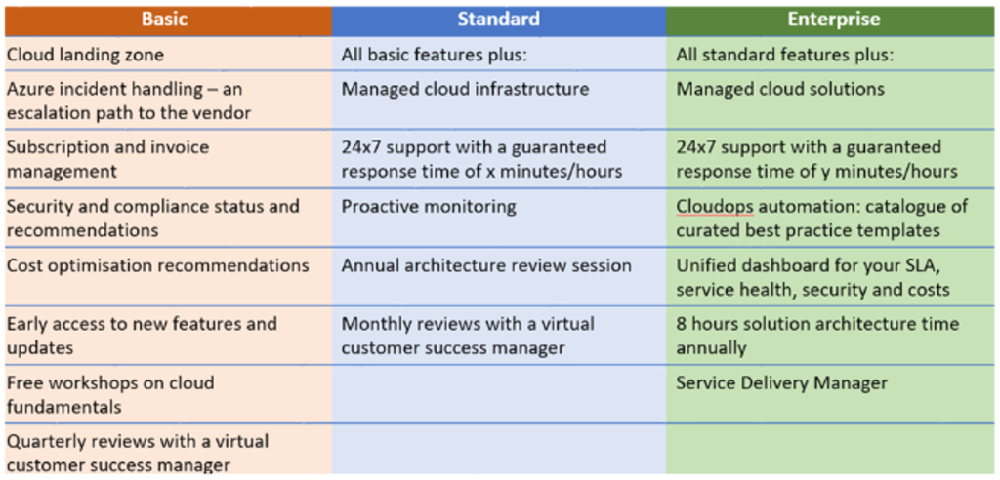The ways that partners can make money
Barry Turner
Senior Consultant, ISSI

One of the questions that ISSI hears from the cloud vendors is, "Exactly how do our partners make money?" It's also a question asked by partners themselves-particularly smaller companies or businesses looking to expand into new verticals or specialties-who want a better understanding of what services generate the highest margins.
The simplest answer is that revenue comes through the cloud managed services provider (MSP) services catalog. But within the catalog, there are five broad categories of services: reselling, technical support, managed services, professional services, and ISV solutions/IP services. A partner could focus on one or multiple areas, with their choices determined by a company's in-house skills and growth strategies. Let's look a bit more closely at each category.
Reselling
Resellers purchase services from the cloud vendors, apply a margin, and then resell them to end-user customers. The pricing model is relatively straightforward: you determine what percentage to put on the cloud consumption. Resellers can also make money by expanding this business model to include services from third-party vendors. For example, a reseller can offer a bundle that includes several basic cloud computing services that are augmented by a firewall or load-balancing services that come from other companies.
Technical Support
Technical support is not always viewed as a revenue generator because customers expect a partner to provide this as part of the contract. However, MSPs cannot only differentiate themselves with fast and efficient basic technical support, but they can also provide technical support across the full range of vendors within the portfolio. In the example used above where the partner has included a third-party load balancing service, the technical support includes both the cloud vendor and the load balancer vendor. Technical support across multiple vendors helps with differentiating the service and maintaining gross margins. Some vendors operate a "partner-led" support model where level 1, 2, and 3 support is managed by the partner with only identified cloud vendor product issues being escalated to the vendor. This typically provides the partner with a higher margin, However, profit margins in this scenario are usually offset by investments in people, expertise, and tightly coordinated processes.
Managed Services
Simply defined, managed services entail a partner operating and managing one or more cloud workloads for customers and charging a fee for the service. The most common kind of managed services involves essential operational tasks such as change management, patching and upgrades, compliance, data backup and availability, security monitoring, release management (DevOps), and workload optimization.
The fees for managed services depend on the pricing model the partner implements. For example, they may charge based on a customer's monthly or annual cloud consumption costs. This works well for dynamic workloads that scale up and down frequently. Another option is fixed fees for managed objects such as VMs or databases, fixed fees work best for static workloads. There are also activity-based fees, which require extensive, granular data on how much time and effort is required to provide the service, such as managing a very large volume of VMs. This data is then used to price up contracts based on the type and volume of tasks required to manage the customer's cloud estate.
Finally, there are fixed-fee services based on predictable workloads. These are usually found in scenarios where the partner provides a full-stack solution, with pricing that includes infrastructure and application support in addition to consumption. Customers with a low appetite for risk often prefer this model. This scenario works best when providing support for large enterprise customers with mission-critical operations. The majority of partners will use a mix of two or more pricing models so that proposals can be specific to a customer's requirements.
The majority of cloud MSPs use a tiered model of services where the level of service increases with each tier. Customers value this model when they have workloads with different support requirements e.g., a mission-critical e-commerce site production environment typically needs higher support than the test and dev environment. An example of a tiered service offering is shown below.

ISV Services And IP
A partner can generate revenue by selling its solutions, either as custom IP services or as an ISV. This usually involves applications such as data analytics, ERP, system integration, application support or consultancy, and SaaS/PaaS applications. It's less common than other revenue-generating activities but can deliver high margins, reflecting the partner's investment in developing the service.
Professional Services
Professional services can cover the full life cycle of the customer's cloud experience, from planning a cloud migration to implementation and optimization. They offer a lot of flexibility for partners in terms of pairing their offerings to match the needs of their customer base. Professional services are generally the largest contributor to a partner's gross margins over time.
Professional services generally cover any of ten common areas, including cloud strategy; cloud migration assessment and planning; well-architected framework and security assessments; DevOps consulting; account structure and landing zone design; infrastructure design; application and analytics; landing zone and workload deployments; CI/CD pipeline design and deployments; and training and education services. Five pricing models for professional services are typically used, with most partners using a mix of two or more. The pricing models are:
- Time and materials, with fees based on time and expenses.
- SoW-based fees, with the statement of work outlining the general scope of a project, customer requirements, deliverables, the technology solution(s), risks, and timetables.
- IProductized services, entail a set of deliverables for a fixed fee. This is commonly used for activities such as landing zone creation, migration assessment and planning, and application or database migration.
- Bundled professional services time. In this scenario, a partner bundles professional time or packages it with other activities. Examples might include professional services time packaged in with the managed services fee for a workload, or periodic architecture and cost assessment packaged in with the managed services or support contract for a workload.
- Fee for a defined effort. This usually applies to situations where a partner is selling professional services associated with a completed sprint.
The starting point for determining the best pricing model is looking at your target market. For example, MSPs targeting the SMB market will probably do best by providing productized professional services at a fixed price that are easy to understand and predictable for growing businesses.
Determining the best types of services to offer your target customer base and the pricing models that will bring in the best revenue margins requires careful evaluation and planning. To learn how ISSI can help your company maximize revenue, visit www.issi-inc.com or contact us at asales@issi-inc.com
Additional Articles
3 signs it’s time your company establish a Cloud Center of Excellence
Florence Tadjer and David Pool, ISSI Senior Consultants3 Signs It’s Time Your Company Establish a Cloud Center of Excellence By Florence Tadjer and David Pool, ISSI Senior Consultants A Cloud Center of
Developing the right service portfolio for your business
Ram Singlacher, Senior Consultant, ISSIDeveloping the Right Service Portfolio for Your Business By Ram Singlacher, Senior Consultant, ISSI One of the most vexing problems for partners working in the
You need to assess your customer success practice readiness. Here is why & how.
Jonathan Lee, ISSI Customer Success Practice LeadYou need to assess your Customer Success practice readiness. Here is why & how. By Jonathan Lee – ISSI Customer Success Practice Lead Customer Success
- 19 AUG 2024
Moving Towards a Greener IT
Abdul Shakhashiro, ISSI Senior ConsultantAdherence to environmentally sound practices-and the ability to show measurable results around those practices-is affecting the global partner community. Yet in our work with cloud partners, we often run into organizations that are just beginning to understand the business consequences of not establishing best practices for reducing the impact on the environment.
05 JUN 2023Cloud management platforms: a core component in growing your managed services business
Amarnath Gutta, Senior Consultant, ISSICloud Management Platforms: A Core Component in Growing Your Managed Services Business By Amarnath Gutta, Senior Consultant, ISSI In our work with partners through workshops,
26 FEB 2025Configuration Management Databases: Adding value for partners and their customers
Barry Turner, Senior Consultant, ISSIThe key to implementing an effective CMDB is having accurate information. In the rapidly changing cloud world, information on every configuration item must be automatically and frequently updated. This can be done in real time, although it is more commonly done once a day, either overnight or in a low-demand period.
